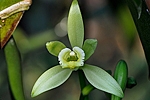There is good news for those who are wild about all things vanilla – from ice cream to candy and even savory foods.
One of the world’s most popular flavors, vanilla comes from vanilla beans, which are grown in Madagascar, Mexico and other tropical regions. Unfortunately, vanilla farmers in these regions struggle to overcome low prices, a fungal disease epidemic, climate stress and environmental deterioration.
UC Davis scientist Sharman O’Neill is working to overcome some of these problems by carrying out genomic research to improve commercial vanilla plants and their sustainable cultivation in Madagascar.
Her efforts were recently recognized by the global food company General Mills, which named O’Neill the national winner of the General Mills Sustainability Challenge, a call for universities’ best ideas for reducing waste, encouraging sustainable consumption and using resources responsibly.

The honor comes with $200,000 to support the genomic vanilla research through O’Neill’s Vanilla Sustainability Project in UC Davis’ College of Biological Science.
The researchers aim to improve the genetic basis of the vanilla-bean crop so that vanilla farmers can overcome the problems posed by disease, climate stress, market uncertainties and environmental decline.
There is a lot at stake here because if these farmers abandon vanilla and change to other crops, the tropical forests, where the vanilla vines grow in compatible agroforestry systems, would likely be cut down. That would destabilize the critical habitat of innumerable plants and animals, including precious species of lemurs in northeastern Madagascar, the major vanilla-producing country.
"General Mills' goal is to maintain a strong, sustainable supply of high-quality vanilla beans," said Steve Peterson, director of sourcing sustainability at General Mills. "That's what this project is all about."
O’Neill’s vanilla research team involves an international group of scientists from the J. Craig Venter Institute in the United States; the French research center CIRAD on Réunion Island; the University of Antananarivo in Madagascar; the Instituto Nacional de Investigaciones Forestales, Agricolas y Pecuarias /SAGARPA in Mexico; and other international collaborators.
As part of the project, the scientists plan to use cutting-edge genomic sequencing and mapping technologies, in combination with traditional plant-breeding methods, to develop improved and new vanilla varieties that are hardier, more disease-resistant and offer enhanced flavor. A separate element of the project will also advance efforts to promote a more equitable model for sustainable vanilla cultivation with General Mills’ business partners.